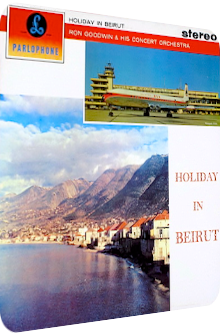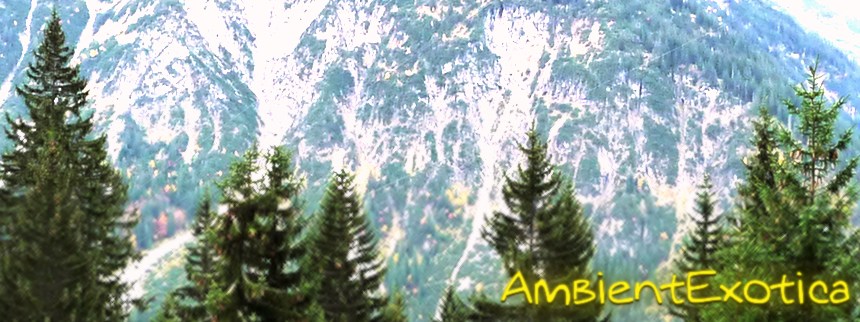
Ron Goodwin
Holiday In Beirut
1962
Beirut is the capital and largest city of Lebanon, and this pretty much sums up my knowledge of this Middle Eastern location. The Mediterranean sea is nearby, people from various countries live and work in the bustling, pulsating streets. It is not exactly the archetypical backdrop for an Exotica record; after all, the Polynesian isles and tropical rain forests are much more exciting, boosting the imagination to new heights. But boy, am I thankful for the existence of Holiday In Beirut. While this seems to be part of Werner Müller aka Ricardo Santos’ series of travelogs, it is actually envisioned and orchestrated by British composer and conductor Ron Goodwin (1925–2003) whose fame would later rise due to his memorable themes of Hollywood movies and British productions like the Miss Marple series of flicks. Now, I am definitely not a fan of Ron Goodwin.
I adore his Space-Age career launcher Music In Orbit (1958), but equally despise the follow-up Music For An Arabian Night (1959) due to its imbalanced use of symphonic helixes amid faux-Oriental sequences. There are not even autochthonous instruments on board. Everything is different on Holiday In Beirut though. Released in 1962 on the Parlophone label and housing 12 exciting compositions by three Lebanese songwriters and duos, Goodwin widens the instrumental pool and allows a strikingly captivating immersion effect to build up: ouds, balalaikas, bouzoukis, bongos, vibes, tasteful accordions, clarinets and string washes intermix in the mountains, become serrated in the valleys, mesh in markets and open streets. Holiday In Beirut is so gloriously real yet entertaining and upbeat that it is an Exotica record for sure, one whose strings only provide the faraway scenery for the local instruments whose omnipresence is a neverending boon.
Crepuscular flutes wait for a new day, unexpected bongo bubbles add fortuitous traces of Exotica to the increasing luminosity, strings veil the panorama with their solemn washes: Sunrise Over The Cedars by the Rahbani Brothers Assi Rahbani (1923–1986) and Mansour Rahbani (1925–2009) experiences a wonderful arrangement once Ron Goodwin has his hands on the material. Mountainous harps, carefully amended via flutes and a piercing accordion round off the aureate vista. While the mysterious N. Al-Basri could serve as a moniker for Ron Goodwin himself, his tune Sweetie Pie is strikingly rustic, almost Persian in quality. The transmogrification from a tramontane landscape to an immediate market place is well achieved. Lebanese ouds and other rubicund stringed instruments ameliorate the harmonica coils and the Flamenco spirit. This is one truthful Exotica sparkler alright!
The Rahbani Brothers’ Ba’albeck is next, presenting a bongo-infused array of blood-red strings of portent adjacent to a sanguine piano aorta, whereas Lebanese singer Philimone Wehbe’s Bassita! is a rather uplifting gypsy tune with vivacious drums, bassouki interstices and ligneous drums. Helicoidal accordion lines and sun-lit clarinets round off a celebratory Exotica track that ostracizes the orchestral strings in order to give a close, more private look of the scenery. The Rahbani tune April Is Coming then enchants with a vibraphone vestibule to a saltatory flute floralcy and mauve-tinted string washes aplenty, with Wehbe’s second composition Bashtiki-Boom rounding this gorgeous Spy Jazz theme off with dubiously glistening ouds, brazen horns and discordant pizzicato strings of pressure. A gorgeous way to end side A!
Ron Goodwin opens side B with another Rahbani piece, the first of five additional sparklers to materialize: Journey To Damascus is similar to Dizzy Gillespie’s Caravan in that it is tinted in saffron cloudlets, dusty strings and humid flute washes. This is almost too unreal to be exotic; the strings are absolutely stunning on this piece, the orchestra emanates thermal heat aplenty! Next to this aural desert is Grotto Of Jeita, a twinkling piece of circumambience. Superimposed high frequency vibes, portentous clarinets and peaceful accordions create a moment of tranquilizing twilight. Philimone Webe’s third song is also his last: Arak And Tabouli is rich in alluvial polyphonies accordion-wise. Large-grained shakers boost the power of the raucous strings and horns, even marimba cataracts make it to the scenery.
The album ends with a Rahbani triptych: Avenue Des Français is less dedicatedly French than inspired by Moroccan tone sequences and shady clarinet/flute dualities. In addition, Plain Of Bekaa is hued in sunlight due to the warmly heterodyned frequencies and stacked accordions. The ouds, bouzoukis and accordions exude the odour of hay, dry meadows and cloudless skies, whereas the finale Farewell To Lebanon celebrates the goodbye through a revved up presence of the galloping drums. Silvery bongo drums, rhythmic acoustic guitars, withdrawn piano chords and majestic string concoctions round off a magnificent exodus.
Ron Goodwin’s Holiday In Beirut is a fantastic effort because of its truthiness. In lieu of Hollywood strings – which the British composer probably found incompatible at this point of his career anyway – or histrionic whirls, the aural cinematography is erected and maintained by different means. The original Lebanese instruments are but one important pillar of the orange-colored mountains. There is much more to discover here: the accordion is always and without exception skillfully played, never dropping even a little molecule of chintziness, the symphonic strings only form the distant background for a rather immediate and rural focal point that is a close to the sceneries as possible, and last but definitely not least is the rhythmic bongo coppice which vaporizes the smell of firs and olive trees. A most horticultural effort!
Recapturing the introductory paragraph, I am indeed a bit wary in terms of the forerunner Music For An Arabian Night, but strangely enough, Holiday In Beirut, while sharing many a harmony-related sentiment, encaptures the true spirit of Beirut. This is not one of the archetypical holiday releases, no: Beirut is aglow, features orange sunrises and fiery sunsets and brings the listener to a rural, fascinating Middle Eastern place. It is available on vinyl, on CD where it is coupled with the Arabian counterpart, and considered on streaming as well as download platforms. Wholeheartedly recommended!
Exotica Review 386: Ron Goodwin – Holiday In Beirut (1962). Originally published on Nov. 1, 2014 at AmbientExotica.com.
